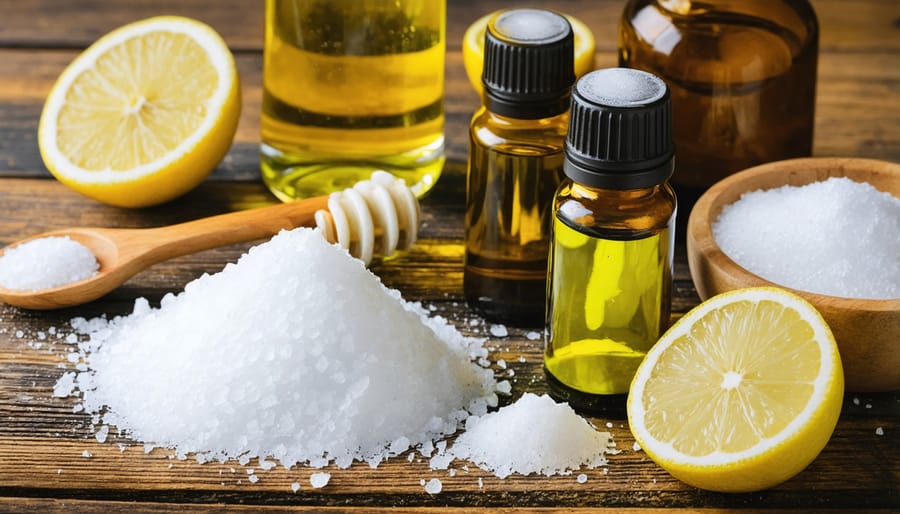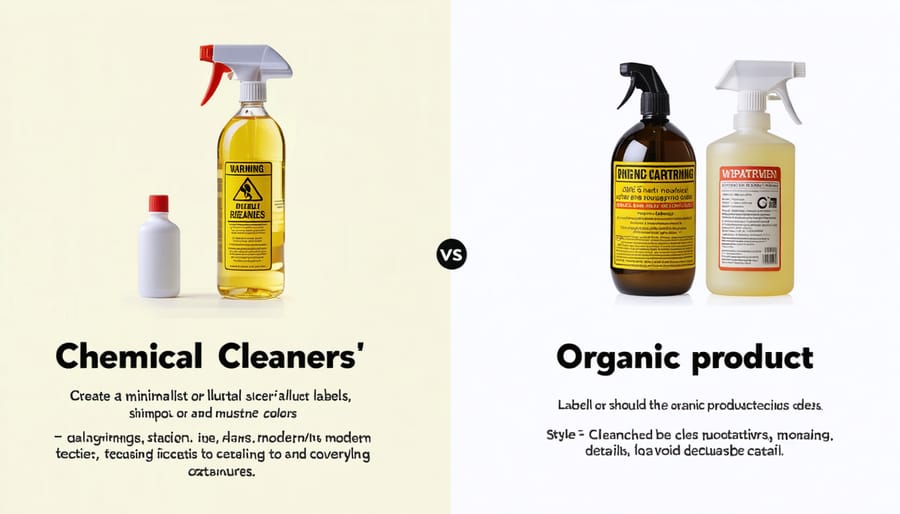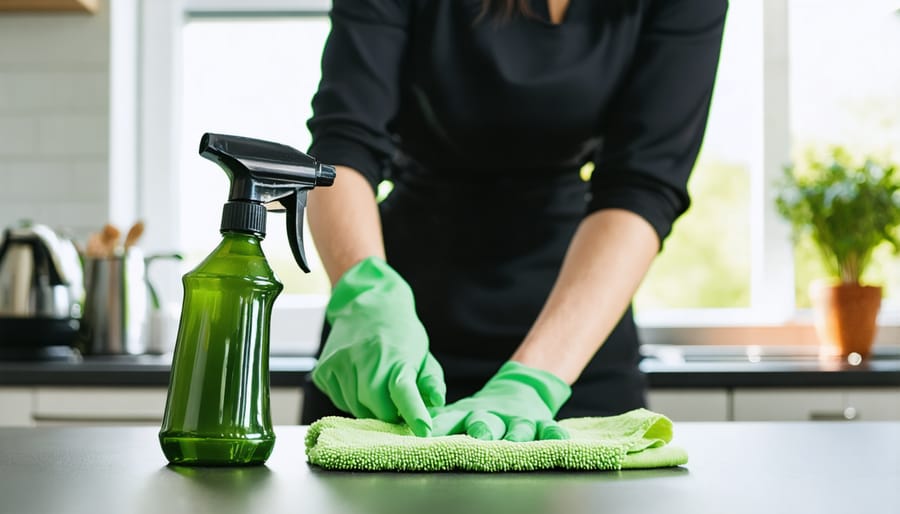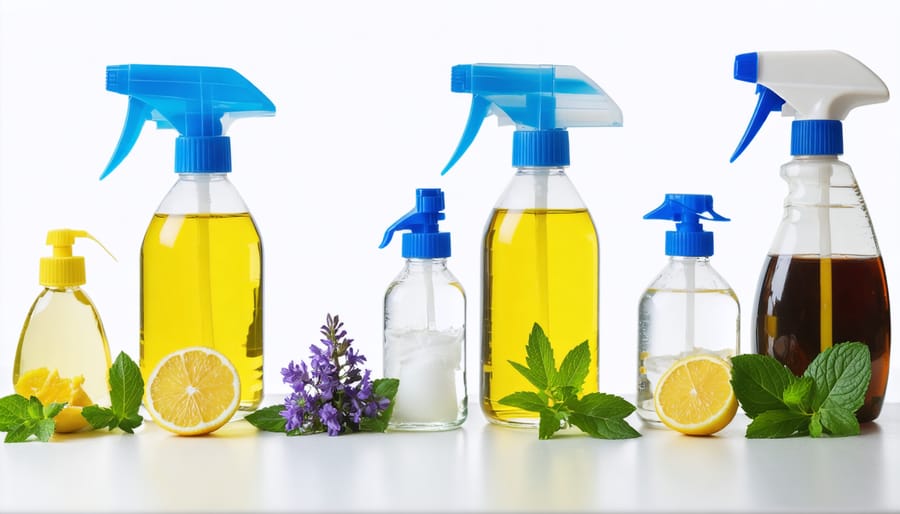Transform your living space into a toxin-free sanctuary with pure, natural cleaning solutions that harness the power of organic ingredients. By adopting organic home cleaning methods, you’re not just following the latest home improvement tips – you’re making a conscious choice for your family’s health and environmental wellbeing.
Traditional cleaning products often contain harsh chemicals that can irritate airways, harm pets, and pollute indoor air quality. Organic alternatives, whether store-bought or homemade, offer equally effective cleaning power without the synthetic fragrances, petroleum-based solvents, or artificial preservatives. These gentle yet powerful solutions work in harmony with nature, using ingredients like vinegar, baking soda, and essential oils to break down dirt, eliminate bacteria, and leave surfaces sparkling clean.
Beyond the immediate benefits to your home environment, organic cleaning supports sustainable living practices. By choosing biodegradable ingredients and reusable containers, you’re reducing plastic waste and chemical runoff while creating a healthier planet for future generations. Whether you’re a seasoned eco-warrior or just beginning your natural living journey, transitioning to organic cleaning methods is a simple yet impactful step toward a more conscious lifestyle.
Why Switch to Organic Home Cleaning?


Health Benefits for Your Family
Making the switch to organic home cleaning isn’t just about going green – it’s about creating a healthier environment for your loved ones. Traditional cleaning products often contain harsh chemicals that can linger in the air and on surfaces, potentially causing respiratory issues, skin irritation, and other health concerns, especially in children and pets.
By choosing organic cleaning solutions, you significantly reduce your family’s exposure to toxic substances like ammonia, chlorine, and artificial fragrances. These natural alternatives are particularly beneficial for households with allergy sufferers, asthma patients, or sensitive individuals. Children, who often play on floors and frequently put their hands in their mouths, are especially vulnerable to chemical residues from conventional cleaners.
The benefits extend beyond immediate health impacts. Organic cleaning products help maintain better indoor air quality, as they don’t release volatile organic compounds (VOCs) that can contribute to headaches, dizziness, and respiratory problems. Plus, natural cleaners typically have gentler, plant-based scents that won’t trigger headaches or allergic reactions.
For families with pets, organic cleaning solutions provide peace of mind. Since our furry friends spend a lot of time on cleaned surfaces and may accidentally ingest cleaning residues, using non-toxic alternatives helps keep them safe. The gentle nature of organic cleaners also means less worry about accidental exposure or spills, making your cleaning routine both effective and worry-free.
Environmental Impact
Switching to organic home cleaning methods isn’t just about creating a healthier indoor environment – it’s a powerful way to reduce your environmental footprint as part of an overall eco-friendly home maintenance strategy. Traditional cleaning products often contain harsh chemicals that can harm aquatic life when they enter our waterways through drains. By contrast, organic cleaners break down naturally without leaving harmful residues in our ecosystem.
The environmental benefits extend beyond water pollution. Many conventional cleaning products come in single-use plastic containers, contributing to our growing waste crisis. Organic cleaning solutions often utilize concentrated formulas or come in recyclable packaging, significantly reducing plastic waste. Better yet, making your own cleaners with ingredients like vinegar, baking soda, and essential oils eliminates packaging waste almost entirely.
Another significant advantage is the reduction in indoor air pollution. Traditional cleaning products release volatile organic compounds (VOCs) that can linger in your home for days. These compounds not only affect indoor air quality but also contribute to outdoor air pollution. Organic cleaners, especially those made with natural ingredients, release minimal to no VOCs, helping maintain cleaner air both inside and outside your home.
By choosing organic cleaning methods, you’re also supporting sustainable farming practices, as many organic cleaning products use plant-based ingredients from certified organic sources. This helps reduce the environmental impact of conventional agriculture and promotes biodiversity.
Top-Performing Organic Cleaning Products
All-Purpose Cleaners
When it comes to keeping your home spotless naturally, all-purpose organic cleaners are your best friends. These versatile solutions can tackle multiple surfaces while keeping your living space free from harsh chemicals. The beauty of organic all-purpose cleaners lies in their simplicity and effectiveness.
One of the most popular natural combinations is white vinegar and water in equal parts. This dynamic duo cuts through grease, removes soap scum, and disinfects surfaces naturally. For extra cleaning power, add a few drops of lemon essential oil – not only does it boost cleaning effectiveness, but it also leaves a fresh, natural scent.
Another powerhouse mixture combines baking soda with liquid castile soap. This gentle yet effective paste works wonders on countertops, sinks, and even stubborn bathroom grime. Simply mix three tablespoons of baking soda with one tablespoon of liquid castile soap, then add water until you achieve a paste-like consistency.
For those who prefer ready-made solutions, look for products containing plant-based ingredients like citrus oils, coconut-derived surfactants, and enzyme cleaners. These natural alternatives are particularly effective on kitchen surfaces, bathroom tiles, and wooden furniture. When shopping, check for certifications like USDA Organic or Green Seal to ensure you’re getting genuine organic products.
Pro tip: Add a few drops of tea tree oil to your organic cleaning solution for additional antimicrobial properties. Just remember to test any new cleaner on a small, inconspicuous area first, as some natural ingredients like vinegar aren’t suitable for certain surfaces like marble or unsealed wood.
These all-purpose cleaners not only keep your home sparkling but also contribute to better indoor air quality and a healthier living environment for your family.

Kitchen and Bathroom Solutions
Kitchens and bathrooms present unique cleaning challenges due to moisture, bacteria, and heavy use. Fortunately, organic solutions can effectively tackle these high-traffic areas while keeping your family safe from harsh chemicals. For your kitchen, combine equal parts white vinegar and water in a spray bottle to create an all-purpose cleaner that’s perfect for countertops and kitchen organization solutions.
For stubborn grease, make a paste using baking soda and water. Apply it to stovetops or backsplashes, let it sit for 10 minutes, then wipe clean with a damp cloth. Tea tree oil mixed with water (10 drops per cup) creates a powerful natural disinfectant that’s perfect for cutting boards and food preparation areas.
In the bathroom, tackle mineral deposits and soap scum with a mixture of white vinegar and lemon juice. Spray the solution on shower walls and fixtures, wait 15 minutes, then scrub gently. For toilet cleaning, sprinkle baking soda around the bowl, add a cup of white vinegar, and let the fizzing action work its magic for 10 minutes before scrubbing.
A natural scrub made from coarse salt and baking soda works wonders on bathtub rings and tile grout. For mirrors and glass surfaces, mix equal parts water and white vinegar in a spray bottle, then wipe with old newspaper for a streak-free shine. Keep bathrooms fresh by placing a small bowl of baking soda with a few drops of essential oil (lavender or eucalyptus work great) in a corner to absorb odors naturally.
Floor and Surface Cleaners
When it comes to keeping your floors and surfaces spotless naturally, different materials require specific approaches. For hardwood floors, a simple mixture of warm water, white vinegar, and a few drops of lemon essential oil works wonders while protecting the wood’s natural finish. This solution not only cleans effectively but also leaves behind a fresh, natural scent.
For tile and stone surfaces, combine equal parts water and white vinegar with a splash of liquid castile soap. This gentle yet powerful mixture cuts through grime without damaging delicate surfaces. When dealing with marble or other sensitive stone surfaces, avoid acidic cleaners and opt for a solution of warm water and mild castile soap instead.
For those seeking eco-friendly carpet cleaning solutions, a combination of baking soda and essential oils works beautifully. Simply sprinkle the mixture over your carpet, let it sit for 15 minutes, and vacuum thoroughly. This natural deodorizer freshens while removing light stains and dirt.
Glass and mirror surfaces respond well to a simple mixture of water, white vinegar, and cornstarch. This combination leaves surfaces streak-free and sparkling without the harsh chemicals found in conventional cleaners. For stubborn spots, add a few drops of tea tree oil, which acts as a natural disinfectant.
Remember to always test any cleaning solution on a small, inconspicuous area first, especially on natural materials like wood or stone. Store your homemade cleaners in clearly labeled spray bottles, and always shake well before use to ensure ingredients are properly mixed.
Glass and Mirror Cleaners
Keeping your glass surfaces sparkling clean doesn’t require harsh chemicals. Natural solutions can achieve professional-level streak-free window cleaning results while being safer for your family and the environment.
One of the most effective organic glass cleaners is a simple mixture of white vinegar and water in equal parts. This solution cuts through dirt and grime while leaving surfaces gleaming. For extra cleaning power, add two tablespoons of cornstarch to your mixture – it helps prevent streaking and adds gentle abrasion for stubborn spots.
Another powerful natural option combines 2 cups of water, ¼ cup of white vinegar, and 10 drops of essential oils like lemon or tea tree. These oils not only add a pleasant scent but also provide additional cleaning properties. For best results, store your homemade solution in a dark glass spray bottle to preserve the essential oils’ effectiveness.
When cleaning mirrors and glass surfaces:
– Use lint-free microfiber cloths instead of paper towels
– Spray the solution onto the cloth rather than directly on the surface
– Work in small sections, using circular motions
– Finish with straight up-and-down strokes
– Keep your windows out of direct sunlight while cleaning
For tough spots, try a paste made from baking soda and water. Apply gently with a soft cloth, then remove with your vinegar solution. Remember to always test new cleaning solutions on a small, inconspicuous area first to ensure they won’t damage your surfaces.
DIY Organic Cleaning Solutions
Basic Ingredients You’ll Need
Getting started with organic home cleaning is easier than you might think! Most of the ingredients you’ll need are probably already in your kitchen cabinets. Here’s your essential shopping list for natural cleaning solutions:
White Vinegar: This versatile powerhouse cuts through grease, removes mineral deposits, and naturally disinfects surfaces. Keep a few bottles handy – you’ll use them often!
Baking Soda: A gentle yet effective abrasive that deodorizes while it cleans. Perfect for scouring sinks, freshening carpets, and eliminating tough stains.
Lemon: Nature’s brightest cleaning assistant! Fresh lemons provide natural antibacterial properties and leave behind a fresh, clean scent.
Castile Soap: This plant-based soap is gentle yet effective for all-purpose cleaning. Look for unscented versions if you plan to customize with essential oils.
Essential Oils: Tea tree, lavender, and lemon oils add natural fragrance while providing antimicrobial benefits. Just a few drops go a long way!
Hydrogen Peroxide: A natural alternative to bleach that’s excellent for disinfecting and whitening.
Salt: Coarse salt works as a natural scrubbing agent for tough stains and can help boost the cleaning power of other ingredients.
Olive Oil: Perfect for polishing wood and leather furniture while providing natural moisture protection.
Pro tip: Store these ingredients in clearly labeled containers, and always keep spray bottles handy for mixing your cleaning solutions. With these basic ingredients, you’ll be ready to tackle almost any cleaning task naturally and effectively!

Simple Recipe Combinations
Creating effective organic cleaners at home is easier than you might think! Here are some simple yet powerful combinations using ingredients you probably already have in your kitchen.
All-Purpose Cleaner
• Mix equal parts white vinegar and water in a spray bottle
• Add 10 drops of lemon, tea tree, or lavender essential oil
• Shake well before each use
Perfect for: countertops, tables, and non-porous surfaces
Glass and Mirror Cleaner
• Combine 2 cups water with ¼ cup white vinegar
• Add 2 tablespoons corn starch
• Pour into a spray bottle
Tip: Use newspaper instead of paper towels for streak-free results
Deep-Cleaning Paste
• Mix ½ cup baking soda with enough water to form a paste
• Add 5 drops of tea tree oil (optional)
Perfect for: bathtubs, sinks, and stubborn stains
Natural Drain Cleaner
• Pour ½ cup baking soda down the drain
• Follow with ½ cup vinegar
• Wait 15 minutes, then flush with hot water
Tip: Use monthly for maintenance
Wood Furniture Polish
• Mix ¼ cup olive oil with ¼ cup lemon juice
• Apply with a soft cloth using circular motions
• Buff with a clean, dry cloth
Air Freshener Spray
• Fill spray bottle with water
• Add 20 drops of your favorite essential oil
• Add 2 tablespoons witch hazel
Tip: Shake well before each use
Carpet Freshener
• Mix 1 cup baking soda with 15 drops essential oil
• Sprinkle on carpet
• Let sit for 15 minutes, then vacuum
Remember to always test these solutions on a small, inconspicuous area first. Store your homemade cleaners in dark glass bottles or opaque containers, and label them clearly with ingredients and date made. Most of these solutions will keep for about a month when stored properly in a cool, dark place.
These recipes are not only effective but also significantly more affordable than commercial products. Plus, you’ll have the peace of mind knowing exactly what ingredients you’re using in your home.
Making the switch to organic home cleaning is more than just a trend – it’s a sustainable choice that benefits both your family’s health and the environment. Throughout this guide, we’ve explored various natural cleaning solutions, from simple vinegar and baking soda combinations to specialized organic cleaning products, all of which offer effective alternatives to harsh chemical cleaners.
Remember that transitioning to organic cleaning doesn’t have to happen overnight. Start small by replacing one conventional cleaner at a time with a natural alternative. As you’ve learned, many effective organic cleaning solutions can be made from ingredients already in your pantry, making this an economical choice as well.
The benefits of organic cleaning extend far beyond just having a clean home. By choosing natural cleaning methods, you’re reducing indoor air pollution, minimizing chemical exposure for your family and pets, and decreasing the environmental impact of cleaning products on our waterways and ecosystems.
We encourage you to experiment with the DIY recipes and techniques shared in this guide, keeping in mind that different surfaces and situations may require different approaches. Pay attention to what works best in your home and adjust accordingly. Don’t forget to properly label any homemade cleaning solutions and store them safely away from children and pets.
By embracing organic cleaning practices, you’re joining a growing community of environmentally conscious individuals who understand that a clean home doesn’t require harsh chemicals. Your choice to go organic is a step toward a healthier planet and a safer living environment for generations to come.
